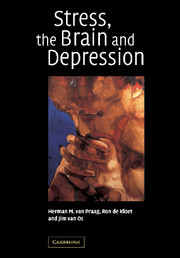Crossref Citations
This Book has been
cited by the following publications. This list is generated based on data provided by Crossref.
van Praag, Herman M.
2004.
Nuclear Medicine in Psychiatry.
p.
161.
Praag, Herman M van
2004.
The Debit Balance of Present Day Stress Research.
The World Journal of Biological Psychiatry,
Vol. 5,
Issue. 3,
p.
155.
de Kloet, E. Ron
Joëls, Marian
and
Holsboer, Florian
2005.
Stress and the brain: from adaptation to disease.
Nature Reviews Neuroscience,
Vol. 6,
Issue. 6,
p.
463.
Van Praag, Herman M.
2005.
Can stress cause depression?.
The World Journal of Biological Psychiatry,
Vol. 6,
Issue. sup2,
p.
5.
Egeland, J.
Lund, A.
Landrø, N. I.
Rund, B. R.
Sundet, K.
Asbjørnsen, A.
Mjellem, N.
Roness, A.
and
Stordal, K. I.
2005.
Cortisol level predicts executive and memory function in depression, symptom level predicts psychomotor speed.
Acta Psychiatrica Scandinavica,
Vol. 112,
Issue. 6,
p.
434.
Terluin, Berend
van Marwijk, Harm WJ
Adèr, Herman J
de Vet, Henrica CW
Penninx, Brenda WJH
Hermens, Marleen LM
van Boeijen, Christine A
van Balkom, Anton JLM
van der Klink, Jac JL
and
Stalman, Wim AB
2006.
The Four-Dimensional Symptom Questionnaire (4DSQ): a validation study of a multidimensional self-report questionnaire to assess distress, depression, anxiety and somatization.
BMC Psychiatry,
Vol. 6,
Issue. 1,
DE RAEDT, RUDI
2006.
Does neuroscience hold promise for the further development of behavior therapy? The case of emotional change after exposure in anxiety and depression.
Scandinavian Journal of Psychology,
Vol. 47,
Issue. 3,
p.
225.
Rüedi‐Bettschen, Daniela
Zhang, Weining
Russig, Holger
Ferger, Boris
Weston, Anna
Pedersen, Else‐Marie
Feldon, Joram
and
Pryce, Christopher R.
2006.
Early deprivation leads to altered behavioural, autonomic and endocrine responses to environmental challenge in adult Fischer rats.
European Journal of Neuroscience,
Vol. 24,
Issue. 10,
p.
2879.
Olsen, L. R.
Mortensen, E. L.
and
Bech, P.
2006.
Mental distress in the Danish general population.
Acta Psychiatrica Scandinavica,
Vol. 113,
Issue. 6,
p.
477.
Hautzinger, M.
2007.
Psychotherapie.
p.
49.
Praag, Herman M. Van
2007.
Hearing Visions and Seeing Voices.
p.
9.
de Kloet, E Ronald
DeRijk, Roel H
and
Meijer, Onno C
2007.
Therapy Insight: is there an imbalanced response of mineralocorticoid and glucocorticoid receptors in depression?.
Nature Clinical Practice Endocrinology & Metabolism,
Vol. 3,
Issue. 2,
p.
168.
Muhwezi, Wilson Winstons
Ågren, Hans
and
Musisi, Seggane
2007.
Detection of major depression in Ugandan primary health care settings using simple questions from a subjective well-being (SWB) subscale.
Social Psychiatry and Psychiatric Epidemiology,
Vol. 42,
Issue. 1,
p.
61.
Firk, Christine
and
Markus, C. Rob
2007.
Review: Serotonin by stress interaction: a susceptibility factor for the development of depression?.
Journal of Psychopharmacology,
Vol. 21,
Issue. 5,
p.
538.
De Kloet, E. R.
2008.
About Stress Hormones and Resilience to Psychopathology.
Journal of Neuroendocrinology,
Vol. 20,
Issue. 6,
p.
885.
van Praag, Hermann M.
2008.
Kraepelin, biological psychiatry, and beyond.
European Archives of Psychiatry and Clinical Neuroscience,
Vol. 258,
Issue. S2,
p.
29.
Firk, Christine
and
Markus, C. Rob
2008.
Effects of acute tryptophan depletion on affective processing in first-degree relatives of depressive patients and controls after exposure to uncontrollable stress.
Psychopharmacology,
Vol. 199,
Issue. 2,
p.
151.
Zetzsche, T.
Preuss, U. W.
Bondy, B.
Frodl, T.
Zill, P.
Schmitt, G.
Koutsouleris, N.
Rujescu, D.
Born, C.
Reiser, M.
Möller, H.‐J.
and
Meisenzahl, E. M.
2008.
5‐HT1A receptor gene C −1019 G polymorphism and amygdala volume in borderline personality disorder.
Genes, Brain and Behavior,
Vol. 7,
Issue. 3,
p.
306.
Van den Bergh, Bea R H
Van Calster, Ben
Smits, Tim
Van Huffel, Sabine
and
Lagae, Lieven
2008.
Antenatal Maternal Anxiety is Related to HPA-Axis Dysregulation and Self-Reported Depressive Symptoms in Adolescence: A Prospective Study on the Fetal Origins of Depressed Mood.
Neuropsychopharmacology,
Vol. 33,
Issue. 3,
p.
536.
van Praag, Herman M.
2009.
Depressive Disorders.
p.
44.





